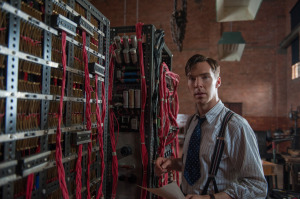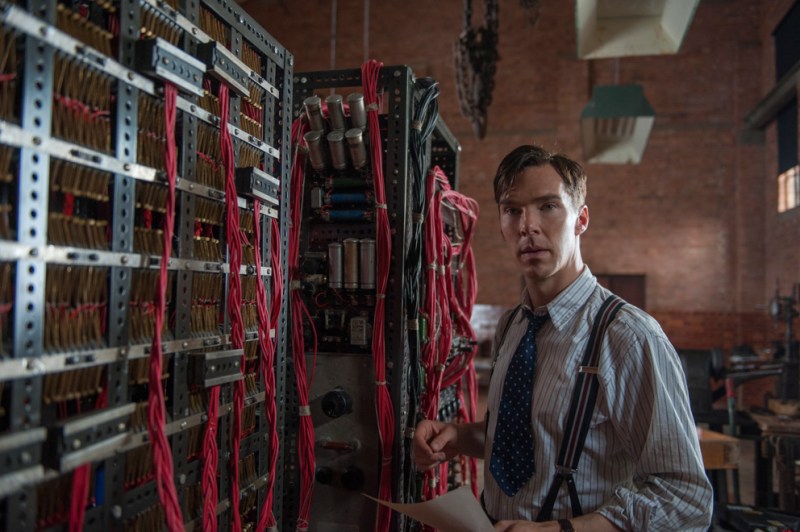
Given the recent wealth of films about science and scientists — from “Interstellar” to “The Imitation Game” — and as one of the few scientists moonlighting as a film critic, I started to wonder: do scientists watch movies about their field differently than other people? Is that especially true for scientists with highly specialized knowledge, when the movie happens to deal, at least somewhat, with that field of inquiry?
To find out, I sat down with three Stanford Ph.D. students — Computer Scientist Chris Piech, to discuss “The Imitation Game”; Theoretical Physicist Richard Jude Anantua, to discuss “Interstellar”; and Astrophysicist, Toni Li to discuss both “The Theory of Everything” and “Interstellar” — to get their perspectives for a series of articles about how scientists think about films about their profession or their field.
All of them found it exciting to see a film about someone or something in their field, which of course also led to some gripes — some minor, some more major —though none of them tended to interfere with their overall enjoyment of the films. Talking to them helped to illuminate the science behind what was happening in the films and to shine light on the age-old stereotypes about scientists that they perpetuate, including downplaying how much hard work goes into any major breakthrough.
For the first article in the series, we sat down with Chris Piech, who works in Stanford’s Artificial Intelligence lab. We discussed how being in A.I. shaped how he thought about “The Imitation Game,” which is a biopic about Alan Turing — the father of modern computer science — and his work during World War II to crack the German Enigma code.
The excitement of actually seeing an entertaining film about someone in your field
When Chris Piech got home from seeing “The Imitation Game,” he recalled, “I started doing my research. It was really motivational. Alan Turing is this person whom, on some level, I look up to. The problems he worked on were really interesting, and the time was interesting. I loved ‘The King’s Speech,’ but I like this more. When I watch movies that have to do with my field, I find it gets me excited, especially because computer science is often sold as so dry. Or, ‘The Social Network,” where it’s like a drunken fraternity experience — also harmful.”
Piech, now in his third year of his Ph.D., after completing an undergraduate degree at Stanford, works in the Artificial Intelligence lab: “I’m doing artificial intelligence applied to human learning, so trying to use the techniques that exist in the A.I. world to find patterns in how students learn. I look at a couple of really large data sets on code.org — it’s an online class [where] they’ve had 40 million people learn the same thing. So [we look at] when 40 million people learn the same thing and do assignments, what patterns emerge?”
“I’d known about Turing’s work, and we study it in classes, but it was really cool to see the story told,” said Piech. One of the things that made “The Imitation Game” feel like a period piece to him was the fact that it was “about computer science as it was done in the 1940s, which is obviously completely different from how it’s done now. I’ve never pulled up a switch board: I write Java.”
In particular, Piech lauds the film for capturing “one of the key parts of any computer scientist’s day — debugging code — [and making it] seem exciting. The process of having a bug and fixing it is really a big part of our lives,” Piech noted. “I thought they did a relatively decent job of capturing that experience of, ‘I know it should work. It’s working. It’s running, but it’s not running fast enough. I need to do something to fix it.’ I’m amazed that they turned that into part of a movie, because I never thought of it as very interesting.”
How did the film do on the technical side of the code-cracking it depicted?
As for the overall technical correctness of the film, the problem for Piech wasn’t so much that “The Imitation Game” got things wrong, but that it doesn’t go into much detail. “For me, I come with so much background knowledge,” Piech clarified, “if they would have made a movie that would have made me happy, it would probably be terrible for a general audience.”
The big breakthrough moment in the film, which allowed the team to finally crack the Enigma code, happened when they realized, as Piech recalled, “ ‘Heil Hitler’ and ‘the weather’ always show up, at least in this one report” each day. Before this breakthrough, there were 55 million million possible combinations that had to be tested daily to crack that day’s code, but this new insight allowed them to get it down to something computable — something that they could compute on a daily basis, every time the Germans rewired their Enigma machines.
Piech found that Eureka moment invigorating. But then, the film didn’t go on to explain how the codebreakers used this observation to make something computable. Piech bemoaned, ”I wanted to know how they used that in their machine. They’re like, ‘oh, great! We just set these things to be fixed,’ but that is not a specification.”
Piech was very forgiving of this though because the film was more about the man than the work. Piech elaborated, “The fact that he was basically inventing a computer was very lightly touched on, and I think the word ‘computer’ only showed up in text at the end. I thought it was much more about the personal injustice.” At the end of the film, we learn that Turing was persecuted for being gay after the war; he was forced to take estrogen, which wreaked havoc with his body and his mind.
What “The Imitation Game” gets wrong about The Imitation Game
The Imitation Game, which gives the film its title, is now referred to as the Turing Test. The film uses it as a framing device: Turing (Benedict Cumberbatch) recounts a story to a police investigator, and asks him to decide whether or not he’s a machine. The way it’s used in the film barely resembles what the experiment would actually be like, if it were really a Turing Test.
“The Turing test is something that Turing wrote in a paper,” Piech explained, “which was to say, ‘how do we know when we’ve reached artificial intelligence?’ One way to know is you have this test where you have two subjects — normally one is human and one is a machine — and an investigator can ask any questions to either one for five minutes, and at the end, [he or she] has to decide who is the human. If they pick the computer 33 percent of the time, then we would call the computer ‘intelligent.’ It’s something that’s still talked about in artificial intelligence.”
You can’t just have a person sitting in a room talking and do the Turing test on that person: you have to compare that person’s responses to a machine’s responses, and you can’t see which is which beforehand. The whole point is to see if you can tell the difference.
When Turing asks the police investigator, at the end of his interview “Am I machine or am I human?” it’s absurd. Piech scoffed, “he was definitely a person. Very smart. So I was a little offended, and I saw some danger in that portrayal, and I think a creative liberty.” The problem was that the film used the Turing Test to help show us the ways in which Turing was “socially inept,” which Piech elaborated, ”was, I think, trying to build on this bigger theme of is he a machine or is he human?”
Perpetuating harmful stereotypes about scientists
Because the general public gets its cues about what scientists are like from popular culture, including movies like this one, how films portray scientists can have a profound effect on the culture. “The Imitation Game” may not be the worst offender, but it has its issues. For starters, it undermines the hard work that actually goes into solving scientific problems by showing us a Eureka moment happening after a casual exchange. The group of codebreakers are at a bar, drinking, and after hearing a story from a woman that one of them is flirting with, suddenly, as Piech described it, “[they’ve] got the answer! It’s not like, ‘oh, I sat at my desk for four hours and thought it through.’ ”
But perhaps more harmful is the way in which “The Imitation Game” exaggerates the degree to which Turing was a socially inept, lone genius. Piech worries that the film is helping to perpetuate that stereotype of a lone male genius, a “stereotype that [might] make other people [especially women] feel not comfortable in the field [of computer science] and not welcome in the field. Computer Science is getting better. We’re in this very conscious phase where we know about the problem; we kind of understand why it’s there. Maybe that’s why, when I saw it in the movie, I was like, ‘ah, classic.’ ”
Contact Alexandra Heeney at aheeney ‘at’ stanford.edu.
This article and the headline originally misspelled Chris Piech’s last name. The Daily regrets this error.
